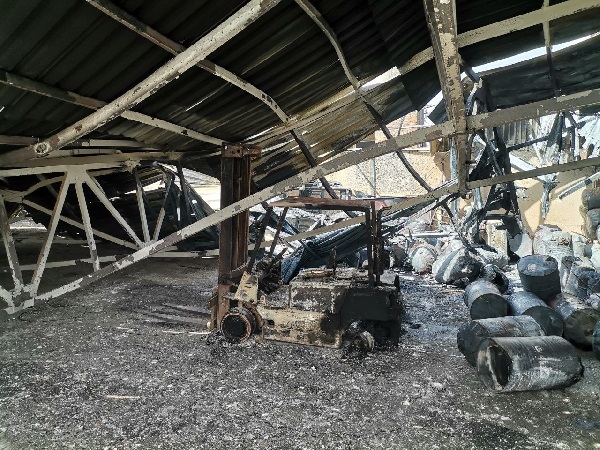The war in Ukraine has caused and continues to cause horrendous damage. Among the casualties is a lubricants manufacturer in the eastern city of Kharkiv that was destroyed last month.
Grom-Ex, a family-owned business, was leveled in what appears to have been an attack using thermobaric missiles, according to owner Roman Lyubin. The factory had capacity to make 12,000 metric tons per year of lubricants plus approximately 8,000 t/y of automotive coolants.
The second-largest city in Ukraine, Kharkiv is less than 20 kilometers from the northeastern border with Russia and came under heavy bombardment when Russia invaded Feb. 24. Lyubin and his family sought refuge in Berlin. He learned of what happened to his business from witnesses who remained in the city, including two security guards who were on-site when the plant was bombarded around 1 a.m. on April 30.
“What happened is what you see in the nightmares,” Lyubin said last week in a video call from Berlin. The plant was struck by two rockets, he said, adding that they clearly differed from most of the rockets that have fallen in Kharkiv, based both upon descriptions that he has received and photos of the aftermath. The security guards, both of whom survived, described an enormous fireball, he said.
“In Kharkiv, there was a lot of devastation, lots of air raids in the neighborhood, and destruction was partial,” he explained. “In some places a roof collapsed, or a wall has fallen, or there are holes in the wall. But destruction of the magnitude that we experienced hasn’t happened anywhere [in Kharkiv]. Our plant is completely, 100% burned. The roofs and walls have fallen, all of our raw materials are burned, it burned remaining finished products. Everything that was on the premises of our plant is burned completely.
Thermobaric bombs are designed to be more thoroughly destructive than conventional rockets. The latter have a single detonation that causes shock waves and disburses projectiles. Thermobaric weapons use an initial charge to disburse mixtures of explosive powdered metals or organic materials, which can scatter around and into structures. A fuel-oxidant mixture then ignites the materials, causing a massive fireball. Some thermobaric weapons create fires that burn so hot they create vacuums that deplete oxygen enough to kill individuals nearby.
Thermobaric weapons have been used for several decades, mostly by Russia and the United States. Ukrainian officials accused Russia of using them the past week during a broad offensive across Eastern Ukraine. Russia has acknowledged using them earlier during the invasion.
Lyubin provided photos showing Grom-Ex’s site leveled and burned.
In a previous call in March, Lyubin hoped that the war would end soon and that he could return to Kharkiv to restart the factory with much bigger ambitions in mind. The bombing dashed his dreams.
Now he and many other business owners are pinning their hopes on reparations that they could use to rebuild. He has begun documenting the damage and contacting the local business bureau to establish a record, and he encouraged other business owners to do likewise.
He acknowledged, though, that the outlook is very vague for now.
“We haven’t looked for lawyers or organizations because it is still early,” he said. “Where we go from now on very much depends how this war ends. Everything depends on whether we see capitulation of the Russian Federation or some other kind of outcome.”
The European Commission recently presented a plan for the European Union’s immediate response to address Ukraine’s long-term reconstruction. It includes an initial pledge of €4.1 billion in financial assistance for overall economic, social and financial resilience. U.S. President Joe Biden recently signed a U.S. $40 billion aid package for Ukraine.
“A major global financial effort will be required to rebuild the country after the war damage…,” the EC said in a May 18 press release. “While Russia’s aggression continues, the overall needs for the reconstruction of Ukraine are not yet known.”
It added that any efforts should be led by Ukrainian authorities in collaboration with the EU and other key partners, such as G7 and G20 members, and other third countries, as well as international financial institutions and organizations.
“Partnerships between cities and regions in the European Union and those in Ukraine will enrich and accelerate reconstruction,” the press release said.
Ukraine’s National Council for the Recovery from the Consequences of the War recently created an advisory council that includes such economic experts as Michael McFaul, a professor at Stanford University and a former U.S. ambassador to Russia; Matteo Patrone, the director of the European Bank for Reconstruction and Development; and Ivan Miklos, the former finance minister of Slovakia and a visiting professor at Central European University.
Before the war, Grom-Ex produced several motor, transmission and hydraulic oils under the Bars Oil, Barrel, V8 and Motorlux brands. It also produced coolants and brake fluids. It sold its products primarily in Ukraine and shipped some to Azerbaijan, Georgia, Moldova, Tajikistan and some Middle Eastern countries.
The company had expanded since 2014, but its output fell 30% during the pandemic. Grom-Ex estimates that Ukraine’s consumption of automotive lubricants fell to 80,000 tons in 2021.
Now, he said, the lubricant industry has tanked, along with much of the nation’s business activity.
“My assessment is that only 30% of all production capacities in the country are operating,” he said, adding that some businesses are under occupation, some have shuttered because of air raids, and others are hampered by supply chain disruptions.
“Only companies that are small and located in the middle of Ukraine or in the western part can operate, as much as it is possible,” he said. “What is going on now in Ukraine is total chaos.”

Ukraine. Photo courtesy of Grom-Ex
